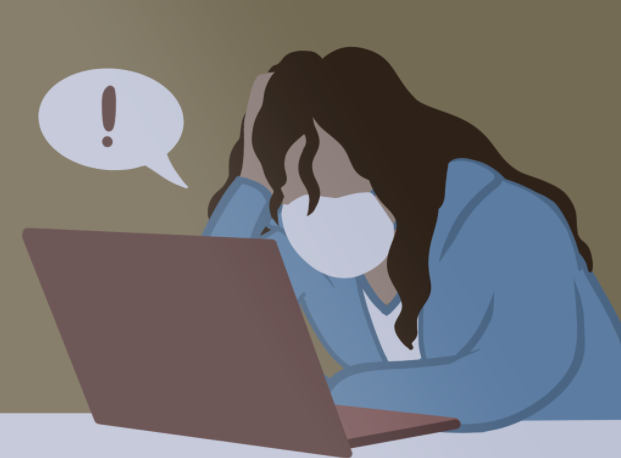Twice a week, Brandon Francois ’24 sits in front of his computer for almost five hours straight. With three back-to-back classes, he leaves his last one exhausted.
“I’m sitting there and it’s so hard for me to focus because I’m so tired, even when it comes to my interesting classes,” Francois said.
He’s not alone in his exhaustion. As a result of the COVID-19 pandemic, increased use of Zoom and other video conferencing platforms have resulted in Zoom fatigue — a documented phenomenon of exhaustion caused by extended hours videoconferencing. But, students and professors have found some ways to mitigate these feelings through self-care and breaks.
Researchers have posed many possible explanations for Zoom fatigue. For instance, some posit that your brain has to work harder to read facial expressions and cues through a computer screen. Another explanation is that mutual eye contact between two people improves connection and makes interaction rewarding. However, when people are only able to look at a camera during a meeting with more than two people, it becomes increasingly difficult to distinguish a mutual gaze, thus reducing the rewards of the interaction.
According to Shea Fedigan, psychiatry clinical assistant professor, the prolonged eye contact on video conferencing platforms is also particularly exhausting. Looking at faces on computer screens and constantly having your camera on instead of having peers around you creates a “heightened sense of being on stage,” she said.
To combat Zoom fatigue, medicine clinical instructor Stephanie Clarke suggested looking down at your notes or taking a pause to look away instead of maintaining eye contact to remedy the exhaustion. She also emphasized the importance of doing small things you enjoy and taking care of yourself in a way that works for you, whether that’s doing yoga, spending time outside or limiting your screen time in other areas of your life.
Fedigan also encouraged students to replicate certain parts of in-person behavior in between Zoom sessions by changing their environment, splashing water on their face and going on a walk. According to her, “these are ways to ground us back into the moment and into our bodies that you normally would get as you’re packing up your book bag or walking to class.” Both instructors also suggested limiting distractions, multitasking, rewarding yourself and engaging all of your senses when possible.
At the beginning of the pandemic, Justin Thach ’23 took on a heavy course load because he assumed he’d have more time. However, he said that Zoom fatigue “manifests in a desire to procrastinate.” He added that the pandemic put a pause on the “college experience,” which he said results in students just trying to get credit for classes. “The emotional consequence is that we can often feel less connected to what we’re doing at school,” he said.
Different living conditions further intensify the problems of adjustment to virtual learning, he said. He questioned how students’ educational experiences during the pandemic could be equitable when students are living and working in such different environments. “Not everybody’s home is the same, not everybody’s sitting at the same kind of desk,” he said.
The academic aspect of videoconferencing is not the only challenge on Zoom — exhaustion also manifests in social connections. Francois said that he has to put in twice as much effort to socialize virtually than he would in-person. He added that there is something about sitting in front of a computer screen, “combined with the monotony of doing it continuously for weeks on end that just kills you.”
While virtual learning has been difficult, Francois said that he has found alternative venues of socialization through conversing in various GroupMe chats and taking Frosh 101, which he said allowed him to “socialize with other freshmen outside of a purely academic sense.”
Thach added that giving himself grace when it comes to his schoolwork has been important in helping him overcome Zoom fatigue and adjust to virtual learning.
“If I let myself burn out or work when I’m tired, then that really puts me at a disadvantage for getting things done,” he said.
While many students face a lack of motivation to complete school work and feel unengaged in their classes, Clarke said that these difficulties are largely because students are being asked to “adapt to a change in behavioral patterns of what they expect from school and how they interact with school to completely change very quickly.” She emphasized that students are not at fault for these feelings.
“It is not you — there is absolutely nothing wrong with you,” Clarke said. “It is really hard to feel connected and motivated and like you’re engaged with your life when you have to be sitting in your space, 24 hours a day, trying to do all this over a screen.”
